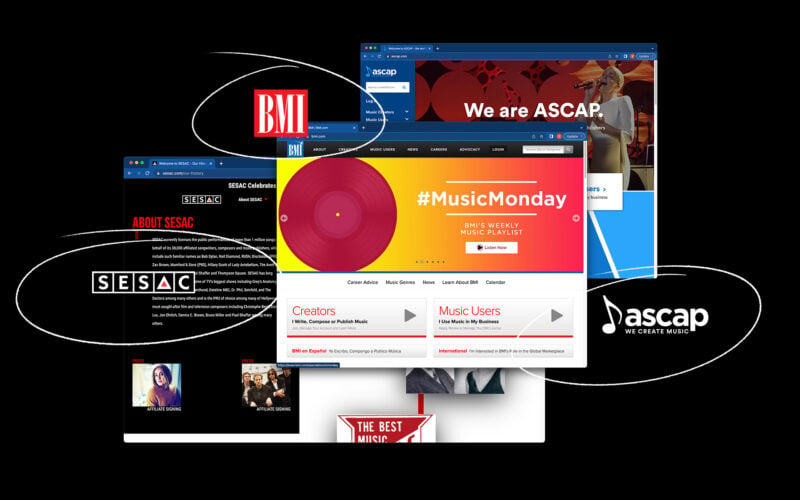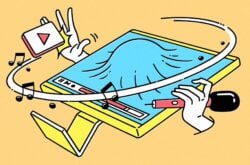One of the most confusing aspects of releasing music independently is making sure you register your songs in all the right places and do everything you can to maximize the amount of revenue you can collect.
If you’ve ever looked into this before, you may have come across terms like PRO, ASCAP, or BMI. But what exactly do they mean, and why should you care? In this article, we’ll answer a few basic questions about PROs (performing rights organizations) and give you a better understanding of what they do, how they work, and whether or not you may want to join one.
Let’s take a look!
What are performing rights organizations (PROs)?
PROs, or performing rights organizations, help collect public performance royalties on behalf of songwriters and publishers. This means that if you’re a songwriter, you can get paid every time a song you wrote gets broadcasted or performed publicly.
PROs facilitate this process by:
- granting licenses to venues, radio stations, and businesses to use their catalog of music in exchange for a fee
- tracking how often each song gets played and, therefore, how much royalty money is owed to songwriters and publishers
- collecting and distributing royalties to relevant parties
Copyright and royalty types
PROs collect just one type of royalty—public performance royalties.
In very broad strokes, every original song has two types of music copyright:
- Composition rights (sometimes called publishing rights) are tied to the lyrics and melody of the song. For example, if Artist A writes and records a song and Artist B later records a cover of it, Artist A still owns the composition rights because they wrote the lyrics and melody.
- Master rights (sometimes called recording rights) are tied to the sound recording. In that same example, Artist B would own the master rights to the cover because they’ve created their own recording.
Public performance royalties vs. mechanical royalties
Composition rights generate two main types of royalties: public performance royalties and mechanical royalties. Master rights also generate different types of royalties, but we won’t get into it in this article.
Public performance royalties get generated and paid to songwriters and publishers any time their song (an original recording or cover) is broadcasted or performed in public. This includes things like:
- songs played on AM or FM radio
- songs played in a TV show, movie, or commercial
- songs performed live, either by the original artist or another artist
- songs played in a public setting like a restaurant, store, dentist’s office, etc.
These are the royalties collected by PROs. If you don’t sign up with a PRO and register the songs you’ve written, you’d be missing out on all this revenue.
Meanwhile, mechanical royalties get generated and paid to songwriters and publishers any time their song (an original recording or cover) is reproduced in a physical or digital format. This includes things like:
- producing a CD or vinyl with the song on it
- someone purchasing a digital download of the song
Interactive streams—when someone chooses to stream a song on a digital streaming platform—generate both performance and mechanical royalties.
Mechanical royalties aren’t collected by PROs—they’re collected by mechanical rights societies and accessed by publishers or publishing administrators.
When should I join a PRO?
You may want to consider registering with a PRO if you’re involved in writing music that will be available to the public. Whether you write the song for yourself or for another artist, or whether you write 100% or 25% of it, you’re entitled to receiving public performance royalties for it. If you co-write with other songwriters, you might consider maintaining a split sheet that states what percentage of the song is written by each writer and, therefore, how the royalties should be split.
You may also want to look into PROs if you’re a music publisher who’s representing other songwriters.
It’s important to note that PROs pay royalties to songwriters and publishers at a 50/50 split. If you don’t have a publisher or a publishing administrator, you’ll need to register with the PRO twice—once as a songwriter and once as a publisher—in order to collect both shares. If you don’t do this, the PRO will keep the publisher’s share and you’ll miss out on 50% of the performance royalties you’re owed.
How do PROs pay artists?
In the US, there are three main PROs to consider: ASCAP, BMI, and SESAC. If you live outside of the US, your country will likely have at least one PRO (for example, PRS in the UK, APRA in Australia, or SOCAN in Canada).
As a songwriter, you typically only need to sign up for membership with one PRO. As a publisher, you’ll likely want to have membership with each of the PROs that represent the songwriters you work with.
If you’re in the US, choosing between the three major PROs comes down to preference. They each have slight differences in how they track, calculate, and pay royalties, so be sure to familiarize yourself with their processes and make a decision that makes the most sense for you.
What is SoundExchange?
SoundExchange is often referred to as another PRO in the US, but it’s actually a different type of organization.
SoundExchange collects non-interactive digital performance royalties on behalf of artists and labels (i.e. on the master rights side of things, as opposed to composition rights).
Earlier in the article, we briefly talked about interactive streams—ones where the listener gets to choose what song they’d like to listen to by interacting with the streaming platform.
Non-interactive streams, then, are streams that listeners don’t get to choose. Pandora and SiriusXM radio are great examples of streaming services that operate this way.
These non-interactive digital performance royalties aren’t collected by PROs, so if you’re also an artist, registering with a PRO like SoundExchange is an important step in collecting them. If you’re based outside of the US, look for a neighboring rights organization in your country (for example, Re:Sound in Canada or PPL in the UK).
This is just the tip of the iceberg when it comes to the different types of royalties you can collect, but hopefully, this article has given you a better idea of what public performance royalties are and why you need to register with a PRO to receive them if you’re a songwriter.
Dive deeper into the world of sync licensing with expert-led insights:
January 19, 2023



